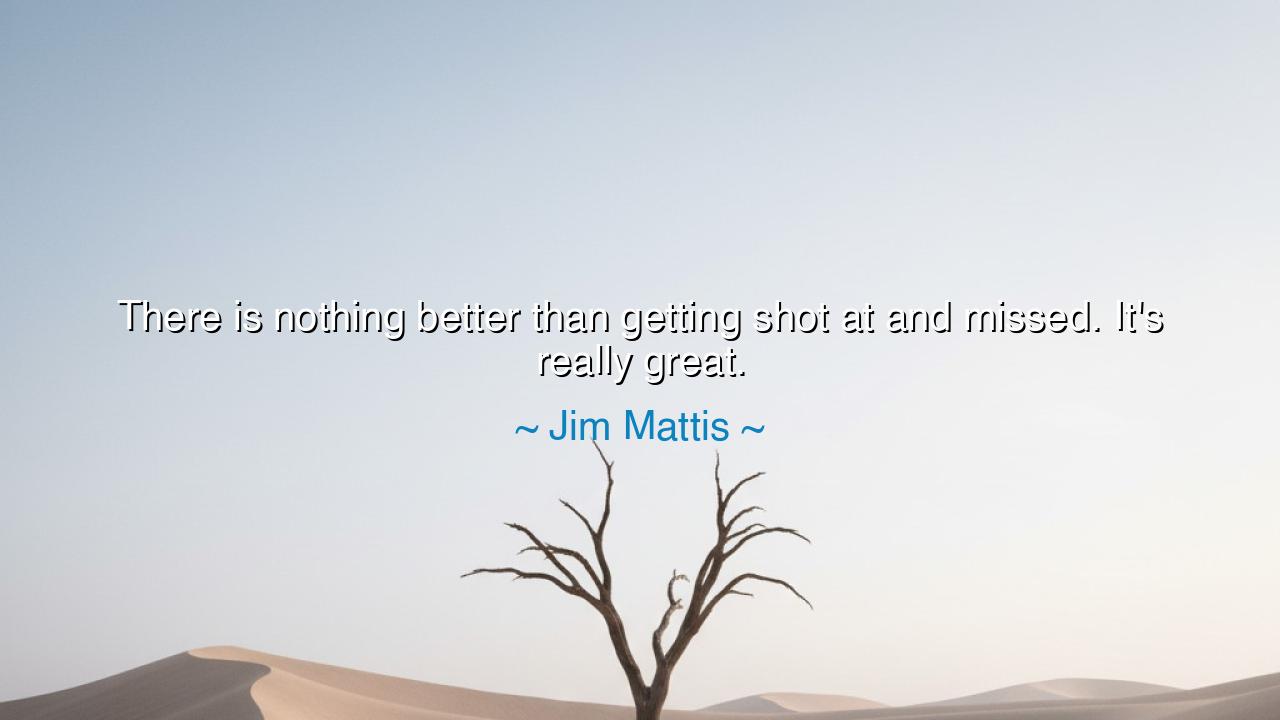
There is nothing better than getting shot at and missed. It's






When Jim Mattis, the warrior-scholar of our age, said, “There is nothing better than getting shot at and missed. It’s really great,” he was not glorifying danger, but expressing the exhilaration of survival — the sacred clarity that comes when life brushes against death, and one discovers the strength still burning within. Beneath the gruff humor of a Marine’s tongue lies a timeless truth: that only those who have faced destruction without surrender can understand the full sweetness of being alive. In those few words, Mattis — a man who spent his life walking the edge between chaos and order — reminds us that fear, when met with courage, becomes the fire that sharpens the soul.
The origin of this quote lies in the hard-won experience of a soldier who has seen both the terror and triumph of battle. General James “Mad Dog” Mattis, a revered commander of the United States Marine Corps, earned a reputation not merely for his tactical brilliance, but for his deep understanding of the human spirit. In the deserts of Iraq and the mountains of Afghanistan, he led men through fire and uncertainty. His words, spoken with wry candor, came from those crucibles — moments when death’s shadow passed close enough to touch, but did not claim its due. The phrase, half jest and half confession, reveals what warriors across centuries have felt: that to live after nearly dying is to see the world anew, cleansed of illusion, raw and real.
To the untested ear, such a statement may sound reckless. Yet those who have faced peril know the strange calm that follows the storm — when the heart, once pounding with fear, settles into fierce gratitude. It is the moment when the mind understands that life is not guaranteed, and therefore, every breath thereafter is a gift. This is what Mattis means when he says, “It’s really great.” It is not the thrill of violence he celebrates, but the humbling joy of survival, the moment of awakening when one realizes that courage has carried them through what might have ended them. In that realization, the trivialities of life fall away, and one is reborn — not as a soldier alone, but as a soul that has looked into the abyss and smiled back.
The ancients knew this truth well. When Odysseus survived the shipwrecks of Poseidon’s wrath and washed ashore on foreign sands, he did not curse the sea — he thanked the gods that he still breathed. When Alexander the Great, struck in battle, rose bloodied but unbroken, he felt the same fierce gratitude that Mattis speaks of. The warrior’s joy is not in the fight itself, but in the affirmation of life through the struggle. Every near miss, every narrow escape, is a teacher — whispering that mortality is not the enemy, but the measure of valor. It is through danger that one learns the depth of one’s own resolve.
But this lesson does not belong only to the battlefield. In truth, life itself is a form of combat — not with bullets or blades, but with despair, hardship, and the countless forces that seek to break the human spirit. Every person, at some point, stands in the open field of fate and feels the arrow of misfortune whistle past. A sickness narrowly survived, a loss endured, a failure overcome — these, too, are the “shots” of life. And when we rise again, breathing and unbowed, we may echo Mattis with quiet triumph: there is nothing better than being “shot at and missed.” For it is in those moments that we remember how fiercely we wish to live, and how strong we truly are.
The deeper wisdom of Mattis’s words lies in their call to courage. He does not suggest that we seek danger, but that we face it unflinching when it comes. For life will test us, as it tests all who walk its path. The question is not whether we will be struck, but whether we will stand when the dust clears. The one who endures, who learns from fear rather than fleeing it, becomes tempered like steel. Such a soul moves through the world with calm strength — unshaken, yet humble, grateful for every dawn that follows a long night.
So, my child, let this truth be your armor: courage is not the absence of fear, but the mastery of it. When you are “shot at” by fate — when danger, failure, or sorrow aims its weapon at you — do not despair if you survive with trembling hands or scarred heart. Rejoice, for you have been tested and found enduring. Let your gratitude burn brighter than your fear, and your purpose outshine your pain. Remember always the wisdom of the warrior Mattis: that even the narrowest escape can awaken greatness, and that to live another day — to rise, to try again, to fight with honor — is truly “great.” For in the end, it is not the shot that defines you, but the fact that it missed.






AAdministratorAdministrator
Welcome, honored guests. Please leave a comment, we will respond soon